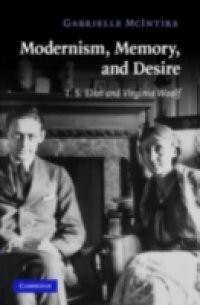T. S. Eliot and Virginia Woolf were almost exact contemporaries, readers and critics of each others' work, and friends for over twenty years. Their writings, though, are rarely paired. Modernism, Memory, and Desire proposes that some striking correspondences exist in Eliot and Woolf's poetic, fictional, critical, and autobiographical texts, particularly in their recurring turn to the language of desire, sensuality, and the body to render memory's processes. The book includes extensive archival research on some mostly unknown bawdy poetry by T. S. Eliot while offering readings of major work by both writers, including The Waste Land, 'The Love Song of J. Alfred Prufrock', Orlando and To the Lighthouse. McIntire juxtaposes Eliot and Woolf with several major modernist thinkers of memory, including Sigmund Freud, Friedrich Nietzsche, Henri Bergson and Walter Benjamin, to offer compelling reconsiderations of the relation between textuality, remembrance and the body in modernist literature.

